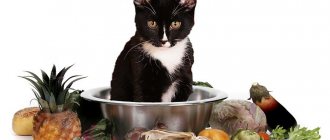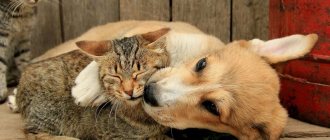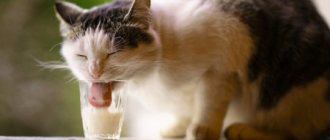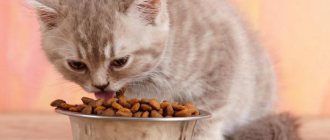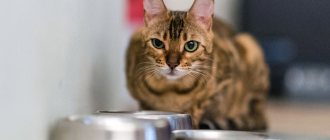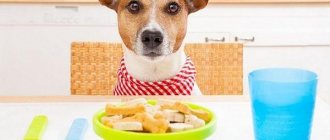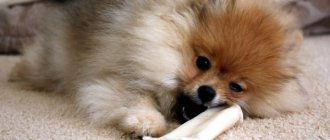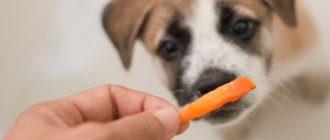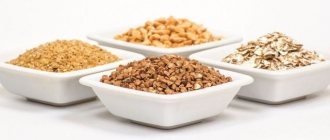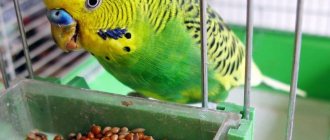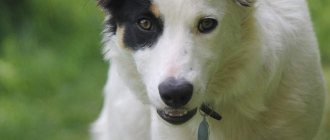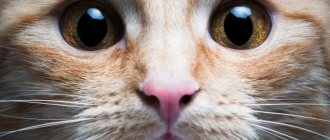List of prohibited products
The following are unacceptable in the diet of any pet, regardless of age:
| Product | Effect produced |
| Chocolate and all products containing cocoa beans | They contain theobromine, which is deadly for cats, which accumulates in the liver, does not decompose, and is not excreted from the body. |
| Alcohol, beer, hops | They are also not excreted from the cat’s body. Inadmissible even in small quantities. |
| Coffee and tea | Any products with high levels of caffeine lead to extensive damage to the cardiovascular and nervous systems. |
| Mushrooms | Lead to severe poisoning, possibly causing immediate death. |
| Potatoes and tomatoes | They contain an alkaloid that promotes severe damage to the gastrointestinal tract (of course, if eaten in large quantities). In the form of puree or juice, the latter do not cause such severe consequences, but there is also no benefit from them. |
| Avocado | Contains persin, which is toxic to the cat's body. Diarrhea, vomiting, and difficulty breathing after eating this fruit are often fatal. |
| Garlic and onion | The disulfite they contain leads to the death of red blood cells and the development of anemia. |
| Rhubarb, sorrel | When they are consumed by cats, poisoning occurs with oxalic acid. May cause kidney failure. When cooked it leads to diarrhea. |
| Stone fruit seeds | Contains hydrocyanic acid, which causes suffocation. |
| Grapes (raisins), citrus fruits, persimmons | They provoke vomiting and diarrhea. |
| Boiled meat, chicken, fish bones | May cause injury and rupture of the intestine. |
Products undesirable in the diet of animals:
- Flour containing nutritional yeast and pasta products will lead to intestinal fermentation and diarrhea.
- Nuts and sunflower seeds in large doses lead to phosphorus poisoning.
- Peas and any legumes do not pose a mortal danger, but they lead to fermentation in the intestines.
- Broccoli contains isothiocyanates that can accumulate in the body; they are acceptable in limited doses.
- Raw and condensed milk and baby formula are harmful to the body of an adult cat. Also read: Can a cat drink milk?
- Raw eggs can cause coat problems due to the enzyme avidin in their composition.
- Fish and pork are allowed in minimal quantities.
- Goose meat, duck meat, and lard due to their high fat content can cause the development of pancreatitis.
- The liver contains many active substances, their excess leads to severe digestive disorders.
- Salt causes electrolyte imbalance in the body.
- Sugar reduces immune responses and leads to diabetes.
- Dry dog food is not recommended for cats; it can cause problems with the cardiovascular system. Read why cats can't eat dog food.
- Vitamins containing iron are unacceptable for people - they lead to disruptions in the functioning of all body systems.
Fatty, spicy, salty foods, preservatives lead to diseases of the gastrointestinal tract, liver, kidneys, diarrhea and vomiting.
What foods can be harmful to health?
The list of prohibited food components for domestic cats includes:
- raw meat and fish, as well as minced meat. They may contain parasites and pathogens. This is why meat is always given boiled or frozen;
- pork and lard. May provoke the development of pancreatitis;
- meat of duck and geese. It is poorly absorbed;
- sweets (especially chocolate and cocoa). Contains theobromine, which is toxic to cats;
- alcoholic beverages (even as a component of sauce);
- coffee and tea (even with milk mixed in). They increase the animal’s excitability and can provoke the development of heart and nervous system diseases;
- mushrooms;
- tomatoes and potatoes. Both vegetables contain alkaloids that are toxic to pets;
- avocado. It contains the toxin persin;
- broccoli, garlic and onion;
- legumes (beans, peas, soybeans). They are poorly absorbed in the cat's body;
- nuts (including peanuts). They contain a lot of harmful phosphorus;
- grapes and raisins, persimmons, oranges, pineapples, kiwis and lemons. May provoke vomiting;
- condensed milk. It is not absorbed in the body of adult animals.
It is also forbidden to give raw eggs. The enzyme avidin contained in them can destroy vitamin H. Bones (especially small ones) should not be offered, as they can get stuck in the digestive tract and lead to the death of the pet.
It is forbidden to feed your cat baked goods. Bread and pasta, as well as spaghetti, are prohibited. No spices, seasonings or sugar are offered. Pickles, preserves, smoked and fried foods can be harmful to your health.
Do not forget that pets can chew house plants. Many of them are toxic and can cause serious intoxication and even death of the animal. Aloe is one of these poisonous indoor flowers. Therefore, when keeping a cat at home, it is better to remove this plant.
Why can't adult cats have milk?
Kittens need mother's milk. If for some reason they are deprived of it, it is acceptable to replace it with special mixtures from a veterinary pharmacy, goat milk, 10 percent cow cream, or, in extreme cases, whole milk.
With the achievement of adolescence, the body undergoes a restructuring; animals produce less of the enzyme necessary for the complete absorption of milk. In adults, lactose intolerance occurs; the product is not broken down into simple sugars and absorbed into the blood. Fermentation occurs in the intestines of the individual due to lactic bacteria, which leads to bloating, increased gas formation and diarrhea.
Sour cream, butter and cheeses are also undesirable in a pet's diet due to their high fat and salt content.
Fermented milk products - kefir, acidophilus, fermented baked milk, sugar-free yogurt will not harm cats.
Strictly prohibited products
When you are preparing a daily diet for your cat, you should consider in advance the list of not only healthy, but also prohibited foods:
- chocolate and cocoa. They contain theobromine, a component that is toxic to a tailed pet. If you feed chocolate to a cat, it will cause serious poisoning, and in some cases can be fatal;
- alcohol. Even if it is contained in meat sauce, such a component causes serious harm to the cat’s body, especially affecting the liver;
- mushrooms. This product often causes toxic shock or even death in the cat;
- tomatoes. They contain an alkaloid, which can cause severe stomach pain in your pet;
- potato. This is a dangerous ingredient for cats because it also contains an alkaloid;
- beans. This product is not very well absorbed by the pet’s body, so it can cause bloating;
- nuts, peanuts. They contain large amounts of phosphorus, which is not recommended for cats;
- bread, spaghetti and pasta. Any yeast products should not be fed to cats. Because of them, animals suffer from bloating.
Raw yolks, condensed milk, aloe, butter - all these products are also included in the list of prohibited foods.
Find out in advance what you cannot feed a kitten and an adult cat in order to properly take care of the health of your pet.
Fish for cats - benefit or harm
Fish and any seafood are not included in the list of absolutely prohibited foods, but they should be included in the diet of pets with caution.
Fish should only be sea and fresh, not containing feed additives (not grown in factories or farms).
There is no point in giving it boiled, since heat treatment reduces the content of enzymes and therefore microelements will not be absorbed.
The catch from the river most likely contains helminths, and the pet will be infected, and if the fish is boiled, it will be useless. Of course, all varieties of carp are prohibited, since their consumption leads to the destruction of vitamin B1 and liver damage.
It is permissible to give cats no more than once a week low-fat and fresh sea species: hake, cod, sardines, trout, peeled and scalded shrimp and squid. But in order to feed an animal with such seafood, you need to live on the seashore or ocean.
Since it is now almost impossible to purchase high-quality sea fish in stores, it is recommended to exclude it from the diet of modern cats.
What not to feed cats: food list
When determining what you can and cannot feed your cat, you should under no circumstances rely on the human diet and feed your pet from your own table. The body's needs for various nutrients are radically different for humans and animals, and some products can cause irreparable harm to the health of a pet. It is quite difficult to independently determine what you should not feed cats, what foods should be excluded from the diet or their quantity should be reduced to an acceptable minimum. The list of products unsuitable for feeding adult cats was compiled by experts based on numerous studies and observations and is divided into several groups.
Meat products
The cat is a natural carnivore and meat is its natural food, the source of most nutrients, animal protein and taurine.
However, the choice of meat products must be approached with caution; some of them pose a considerable danger to the health of the animal. What you should not feed your cat and why:
- Fatty meats (lamb, pork and others) – increases cholesterol levels and leads to obesity.
- Raw, unprocessed meat may contain helminth eggs, Trichonellus larvae (pork), pathogenic bacteria and microorganisms.
- Fried meat is poorly digestible and contains a minimum of nutrients.
- Liver - in large quantities leads to an excess of vitamin A and, as a result, to skeletal deformation, growths on the joints and osteoporosis.
- Sausages, sausages, pates, smoked meats and other products intended for humans contain salt, spices and other additives that are harmful to the health of the cat.
- Bones. Tubular, sharply chipped and boiled bones can lead to serious damage to internal organs and even death of the animal.
Dry food with a high meat content (as the first ingredient in the composition) is ideal for feeding a cat.
Fish
In addition to the possible presence of parasites and the risk of damage to the esophagus from small bones, phosphorus, which is contained in large quantities in fish, poses a danger. When settling in the kidneys, the salts of this element can lead to the development of urolithiasis.
It is allowed to include fillets of low-fat sea fish in the diet no more than 1-3 times a week.
Dairy
An adult cat's body cannot digest lactose, which can lead to stomach upset or vomiting. Fatty dairy products are also dangerous.
Products of plant origin
Tomatoes, eggplants and grapes are poisonous to cats, potatoes are harmless, but lead to digestive problems, legumes increase gas formation.
Other products
Any sweets, chocolate, baked goods, spices, onions, garlic, caffeine and alcohol are strictly contraindicated for cats.
Industrial feed
The main recommendations of veterinarians are that you need to be careful when choosing food for your pet. Give preference to professional premium food containing a balanced set of all necessary substances. The choice of food should take into account the age and health of the animal.
The main signs of a properly selected diet are health, activity, good mood and appearance of the pet. At the same time, do not forget about periodic examinations by a veterinarian - not all diseases caused by poor nutrition can be detected in a timely manner at home.
The dangers of low-quality dry food
Industrially prepared dry and wet cat foods are the simplest nutritional option. But for them to be useful, their composition must be balanced. Proteins, fats, carbohydrates, vitamins, micro- and macro-additives must be contained in the required proportions. Read about the composition of industrial feeds.
Not all industrial mixtures meet such strict requirements. Compositions with a meat content of 50 percent or more deserve a satisfactory rating. Such foods belong to the super premium and holistic classes (Acana, Orijen, GO!). Read our review of the best foods for cats and kittens.
Cheap mixtures, such as Whiskas or Kiteket, contain a lot of vegetable grains and fats; they are not recommended for complete nutrition of pets.
Manufacturers achieve the attractiveness of such cat food through flavoring additives and aromas, which also cause harm to animals.
Dry mixtures containing a high content of soy, wheat, corn, and hydrolysates (artificial proteins) should be avoided. If the components are named with the general term “meat” or “fish”, then this is an undefined raw material and you cannot buy such a product.
The best foods contain more than 70 percent quality meat or fish, whether raw, dried or processed. The composition must be described in detail, indicating the percentage of components.
What not to feed kittens
All prohibited products for adult animals are also unacceptable for young animals. The only difference is that kittens up to six months old are able to digest milk and dairy products.
Mixed nutrition with the simultaneous inclusion of natural food in the diet, for example, raw poultry meat and dry industrial feed, is unacceptable for babies. The fragile gastrointestinal tract is not capable of such stress.
It is better to give meat in the form of minced meat, gradually transferring two to three month old babies to unground food.
Kittens should have small meals - up to six times a day.
Why you can't feed cats from the owner's table
The pet often hangs around when the whole family is having lunch or dinner. It is unlikely that he is hungry, he just requires attention. You should not give him food from plates - most likely, this is food that is strictly prohibited. And this will not add education to the cat.
In addition, human food contains many additional additives (spices, oils, salt, sugar, sauces) that will not bring any benefit.
It is better to feed the cat beforehand or put food in his bowl before lunch. A well-fed animal will quickly wean itself from asking for handouts.
If you want to pamper your pet, it is better to give him a piece of raw meat - veal, beef or chicken, turkey. The only condition is that the product must be frozen for at least three days in the freezer and thoroughly washed with cold water.
This you might not know
There are products that, with a single moderate intake, have no effect on the cat’s body. But if the owner gives them constantly, the pet will soon suffer seriously. In addition, cats have a special liver that cannot quickly digest some toxic ingredients. And if dogs, cows and even chickens can eat a certain product and not get poisoned, then cats, alas, are unlucky in the gourmet business.
These products are harmless at first glance, but their use is fraught with big problems for the cat:
- Avocado . This fruit contains a special ingredient persin, which irritates the gastrointestinal tract and depresses respiratory functions. Fluid accumulates around the heart, making it difficult to function. Delicious avocado threatens cats with death.
- Broccoli . A small amount of this product will enrich the body with beneficial bioflavonoids, but if the cat eats a large amount of broccoli, isothiocyanates will come into play, and they are toxic to the body.
- Raw eggs . The enzyme avidin leads to a deficiency of vitamin B, and the cat's coat begins to fade, fall out, and the skin begins to undergo dermatoses. In addition, a raw egg threatens salmonellosis, and not only for mustaches.
- Nuts . They contain a lot of phosphorus, and its excess is harmful to the body. Macadamia nuts and walnuts are especially poisonous to cats.
- Onion and garlic . In any form and in any dish, these food ingredients are deadly for cats! The disulfide in onions causes anemia in cats. Garlic contains less of this substance, but it is no less toxic.
- Coffee and tea. Cats will drink them willingly, especially with milk, but the matter will very soon end with a disorder of the nervous system and vascular diseases. This is due to the famous caffeine.
- Fresh tomatoes . Inside this delicate delicacy lies a poisonous alkaloid that is harmful to the gastrointestinal tract. Fortunately, when frying or stewing it is destroyed, and the tomatoes become safe. The same applies to potatoes, but when boiled, this fruit is useless for a cat; the intestines will not digest it.
- Fruit seeds . They contain glycosides, due to which the blood stops delivering oxygen to the tissues, and the cat suffocates.
- Dog food . Nothing will happen if you eat it once, but if it becomes a habit, the cat will develop heart problems.
- Alcohol . Have a conscience, gentlemen! How blasphemous it is to mock a gullible pet by offering him alcohol from your own mug. A cat can become intoxicated even from a drop of alcohol licked from the floor. And from higher doses, coma and death occur.
You can’t skimp on your pet’s health, just as you can’t carelessly feed your cat everything. Doesn't your mustache deserve a long, happy life under your careful supervision?
Quality water
The cat has a special kidney structure. At first glance, her fluid requirement is lower than that of a person, and her urine is therefore more concentrated. But your pet still needs quality water every day.
This can be bottled, spring or well water, or any purified and filtered water.
The drinking bowl should be made of stainless steel or earthenware. If it is plastic, then its quality is only acceptable, since cheap material can release harmful substances.
Medicines
For many reasons, home storage of medications must be organized according to all rules and strictly observed. One of these reasons is the curiosity of your pet. Many medicinal smells attract the animal, but this does not mean that it is useful for him.
Make sure that all medications are reliably protected from the cat's arbitrariness and will not be accidentally eaten.
Don't forget that medicine and veterinary medicine are different in many ways. Under no circumstances should a sick cat be treated with human medications, without the permission of a veterinarian! Trying to benefit the pet, you can seriously aggravate the situation. Many of the medications we are familiar with will lead to death of the animal.
List of the most dangerous means:
- analgin - will cause severe poisoning and overload the liver;
- aspirin is practically poison for a cat;
- any drug from the class of antibiotics causes irreparable damage to the liver and kidneys, leading to the failure of these organs and the death of the animal;
- benzyl benzoate ointment can only be used externally for humans, but a cat uses it internally when licking it, resulting in serious poisoning.
The list of prohibited items is supplemented by: biseptol, iodine, Vishnevsky ointment, paracetamol, nurofen, as well as any products that contain phenol, chlorine, sedatives, substances of the NSAID group.
We have listed only the most common medications in a home medicine cabinet, but this list is far from complete! In addition, it is very difficult to correctly calculate the dosage for a cat on your own, so do not neglect the opinion of a specialist and always contact trusted veterinary clinics.
